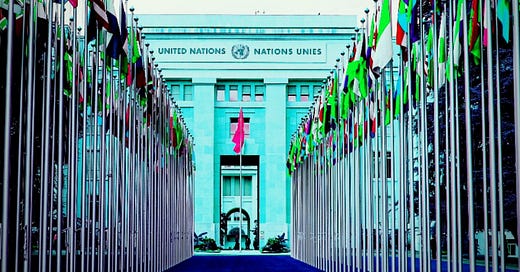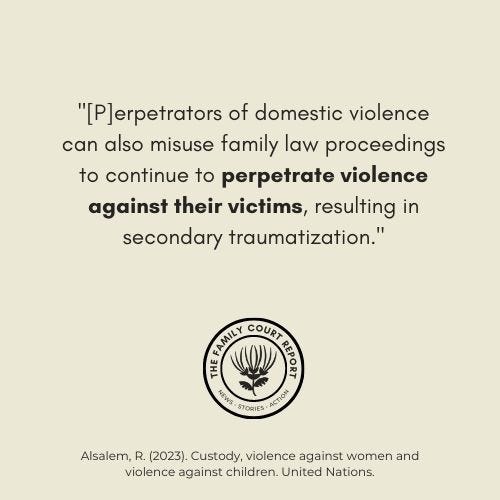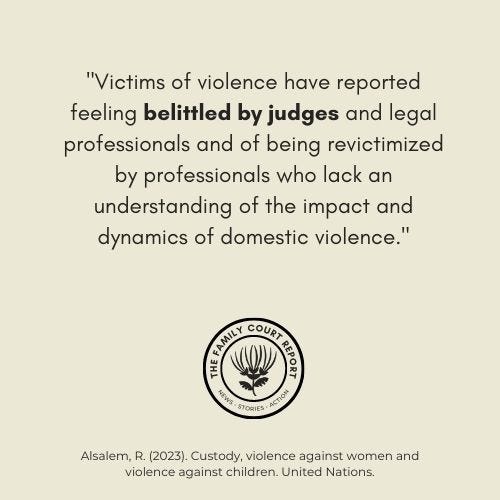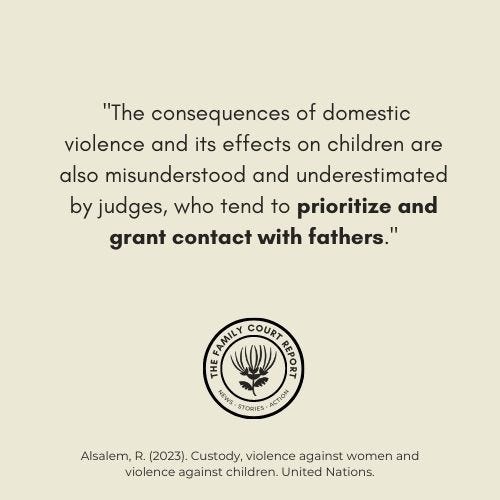FCR 10: United Nations calls out Family Courts around the world
report warns that custody decisions dismiss domestic violence, are corrupted by bias
Family Courts are broken around the world.
Last month on April 13, the UN presented an extensive report addressing “the link between custody cases, violence against women and violence against children, with a focus on the abuse of the term ‘parental alienation’ and similar pseudo-concepts.” The global investigation was led by Reem Alsalem, the UN’s Special Rapporteur on violence against women and girls.
The complete report can be read here: Custody, violence against women and violence against children. Here are some main takeaways.
Dismissal of domestic violence is systemic.
The international report opens by underscoring two alarming observations.
First, that there is a “pattern of ignoring intimate partner violence against women in determining custody cases.”
In other words, men who abuse their wives still have a solid shot at getting custody of their kids, as Courts continue to refuse to acknowledge what healthcare providers and scholars have long asserted—that abusive spouses are far more likely to be abusive parents.
The second concern the report points to is the “tendency to dismiss the history of domestic violence and abuse in custody cases extends to cases where mothers and/or children themselves have brought forward credible allegations of physical or sexual abuse.”
This observation mirrors the conclusions of the 2019 study that examined over 2,000 custody rulings in cases involving domestic violence in the U.S., that FCR shared last month.
That George Washington University report found that in 14% of cases, American Family Courts switched child custody from the mother to the father even though the Court had confirmed the mother’s allegations of abuse. In contrast, in cases where the mother was proven to be abusive, fathers retained custody 100% of the time.
The myth of “parental alienation” is a weapon.
Throughout this report, the theory of parental alienation is referred to as a “pseudo-concept.” Psychologist Richard Gardner coined the controversial term “parental alienation” in the 1980’s to refer to the malicious strategy where one parent unjustly manipulates a child against the other parent during a custody dispute.
“Parental alienation syndrome” has been debunked and rejected by the American Psychiatric Association's Diagnostic and Statistical Manual of Mental Disorders, the World Health Organization, the UN, and countless other scientific communities for lacking proper peer review, Gardner’s minimizing of sexual abuse, and other glaring problems. However, this report finds that in Family Courts around the world, parental alienation continues to be used as a defense and distraction from credible evidence of domestic violence and sexual abuse.

This report also notes that the use of parental alienation points to clear gender bias, as mothers are overwhelmingly accused of using this strategy against fathers, most often in cases where abuse allegations against fathers are present. Once asserted, mothers have little recourse to protect children, as any continued insistence on a need for protections further paint her as trying to “alienate” the child from the father.
Per Alsalem, page 4, section 17:
“The use of parental alienation tends to become a self-fulfilling prophecy. As soon as parents are judged as being “alienating,” “implacable” or “failing to listen”, their actions or inaction can be prejudiced. As a result, allegations of domestic violence remain side-lined as a one-off occurrence. This reduces domestic violence to a minor conflict and stigmatizes and pathologizes women and children.”
The report estimates that 58,000 children in the U.S. are “placed in dangerous home environments” due to mothers losing custody following parental alienation accusations.
One such child was Om Moses Ghandi. The 16-year-old was killed by his father last Saturday, the day before Mother’s Day. His mother, Leah Moses, had been fighting for her son’s safety from his abusive father for over 15 years. After Moses was accused of parental alienation in response to her abuse allegations, the boy’s father was granted full custody of their son.
Family Court abuses are intersectional.
Stereotypes about race and class are exacerbating inequities in Family Courts around the globe. And while migrant mothers and other women with multiple identity markers from communities that have been historically disadvantaged are especially at risk, educated women of privilege are also being discriminated against. It’s a no-win situation for all kinds of mothers everywhere.
Per Alsalem, page 10, section 44:
“In Portugal, while migrant women are labelled as parent alienators, educated women are seen as not fitting into the mainstream image of victims of domestic violence. In Austria and Japan, migrant mothers are at a particular disadvantage owing to language barriers and vulnerable immigration status. In the United Kingdom, intersecting vulnerabilities along lines of race, disability, immigration status and sexuality compound thedifficulties women face when experiencing domestic violence in child custody cases. Mothers in structurally disadvantaged positions are more likely to have their children removed or their parenting capacities judged harshly. In New Zealand, Maori women are more likely to report the involvement of the child protection agency in family court proceedings than non-Maori women.”
A clear call to action.
As alarming as this report is, there’s also something sadly reassuring about it—for those of us who have been screaming into the wind while fighting for our children through these broken systems, it’s a reminder that we’re not alone. Protective parents all over the world, and in fact, the United Nations, are working together to call for change. The report concludes with a clear pathway for progress.
The 19-point list of recommendations from the the Special Rapporteur includes:
(a) States legislate to prohibit the use of parental alienation or related pseudoconcepts in family law cases and the use of so-called experts in parental alienation and related pseudo-concepts;
(b) States comply with their responsibilities and positive obligations under international human rights law by establishing regular monitoring mechanisms to oversee the effectiveness of family justice systems for victims of domestic abuse;
(c) States ensure mandatory training of the judiciary and other justice system professionals on gender bias, the dynamics of domestic violence and the relationship between allegations of domestic abuse and of parental alienation and related pseudoconcepts;
(d) States issue and implement specific guidance to the judiciary on the need to examine each case on the basis of facts and to judge fairly, according to the range of evidence before them, what outcome best supports the welfare of the child;
(e) States institute publicly funded systems of experts to provide information to courts on the best interest of the child and such experts be regularly trained on the dynamics of domestic violence and its effect on victims, including children;
(f) States ensure and maintain a list of approved experts for the family law system and introduce a formal complaint mechanism and an enforceable code of practice that addresses conflicts of interest and the recognition of expertise to practise in this area;
(g) No evaluations be made in family law proceedings without consideration of relevant criminal law and/or child protection proceedings;
(h) Any allegations or evidence of domestic and sexual abuse by both adult and child victims be clearly referred to in evaluations and, if access or custody is recommended, a full explanation be provided as to why such allegations or evidence be included;
(i) States issue guidance to the judiciary on when experts should be used outside of publicly funded systems in family law cases and ensure that experts employed are qualified and professionally regulated;
(j) Training be provided on a mandatory basis for all family justice professionals on the relationship between allegations of parental alienation and domestic violence and sexual abuse; such training should also be provided to combat gender stereotyping and ensure understanding of the legal standards on violence against women and children in this regard;
(k) The Hague Convention on the Civil Aspects of Child Abduction be revised to better protect abused women and their children by allowing a stronger defence against return if there is family and domestic violence, incorporating an understanding that a child’s return order may compel an abuse survivor to return to violence and harm, and that courts with jurisdiction under the Convention be required to consider family and domestic violence when interpreting and applying its provisions;
(l) The use of “reunification camps” for children as part of any outcome in legal proceedings be prohibited;
(m) States ensure that children are legally represented separately in all contested family law proceedings;
(n) States ensure that independent inquiries are established on the use of the pseudo-concept of parental alienation and its iterations, where appropriate;
(o) States ensure that that the views of the child are sufficiently and independently represented in family law procedures and, where possible, children be able to participate in such proceedings, according to their age, maturity and A/HRC/53/36 20 GE.23-06229 understanding and all safeguards and obligations contained in the Convention on the Rights of the Child should be used;198
(p) All agencies and elements of the justice system, statutory services and the domestic abuse sector work together rather than in silos and adequate coordination between the criminal, child protection and family law systems be ensured either by mandatory institutional cooperation mechanisms or the use of integrated court structures;
(q) Wider availability of legal aid in family law proceedings for all parties be made available to ensure equality of arms;
(r) Disaggregated data be collected, including on the prevalence of domestic abuse in family law cases and characteristics of applicants and respondents in such cases, including gender, race, sex, religion, disability and sexual orientation;
(s) States introduce monitoring mechanisms to assess the specific impact of policies and procedures relating to family justice on marginalized groups of women. ⬛
Read the complete report from the United Nations here:
Alsalem, R. (2023). Custody, violence against women and violence against children. United Nations. https://documents-dds-ny.un.org/doc/UNDOC/GEN/G23/070/18/PDF/G2307018.pdf?OpenElement
Everyone deserves to be safe. If you or someone you care about is experiencing domestic violence, you can find free and confidential help and resources through The National Domestic Violence Hotline. Call 1-800-799-SAFE (7233) or text “START” to 88788.










I am a nurse practitioner who cares for people, day and day out yet the judge granted me no access to my child. My husband has full temporary access. I have expressed to the judge that he’s not going to counseling he’s not following orders and the next thing I get is an order stating that my parenting time depends on the recommendations of a counselor, a counselor to which my husband is still not going. This is November, the order was written. It’s five months later, and I have been alienated from my child by the help of the family court system.
I have recordings of gaslighting and lies that were told my daughter and she was was overly hostile, which should’ve been a red flag
he went in and told the judge that I was crazy and irrational and treated him poorly and he did everything for me, and the judge believed him along with connections to a criminal defense attorney, who sent me a message telling me good luck with my charges I know all the prosecutors. They are very well. Tell them I said hello.
. it was almost like a personal vendetta against me, instead of a family court system, protecting the mental health and future of a minor.
My daughter even threatened suicide on a recording over lies. She was told about me. This has been expressed to the family court system and still he has full access, and Counseling has not been enforced. We tried to file contempt of court saying he’s not complying and we’re telling you this for the third time he’s not complying and her order say time with her child depends on the counselors recommendations and the judge put it in the file and said I’m not listening to this and left my child again without Counseling.
These court systems are beyond biased, and they are uneducated as to what parental alienation looks like in this damage that it does to children and it sets that child up to either be a codependent or a narcissist themselves, and it continues the cycle of abuse. It is absolutely destructive Yet they don’t seem to care or understand